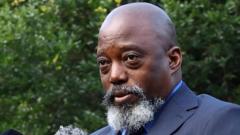The Democratic Republic of Congo's Senate has taken a decisive step by stripping Joseph Kabila of his legal immunity, setting the stage for treason charges against the former president. Accused of backing rebel groups in the eastern regions of the country, Kabila's past actions are now under intense scrutiny following a vote where 90 senators supported the prosecution while five opposed it.
The allegations suggest a substantial connection between Kabila and the M23 armed group, which has seized control of various towns in the mineral-abundant eastern DRC. Although the 53-year-old has denied these claims, he did not present himself before the Senate to mount a defense during the proceedings.
Kabila served as the president from 2001 until 2019 and has since been granted the title of "senator for life," which normally shields him from legal action. However, in light of the serious accusations, the military prosecutor requested the Senate to lift this privilege. Kabila, who has been residing in South Africa for the last two years, expressed intentions to return to Congo to assist in resolving the ongoing conflict, a claim that has been met with skepticism and controversy.
The former president's political party, the People's Party for Reconstruction and Democracy (PPRD), described the move to prosecute him as "pure theatre," aimed at distracting citizens from larger issues facing the country. As the DRC grapples with the M23 rebellion, which has persisted since 2012, analysts worry that a trial of Kabila could further destabilize an already tumultuous political landscape.
In response to the situation, Justice Minister Mutamba has called for Kabila to return to the DRC to address the charges against him and defend himself while simultaneously ordering the seizure of his assets. This unfolding saga is likely to maintain its grip on public attention as tensions rise in a country still navigating the complexities of its recent history.
The allegations suggest a substantial connection between Kabila and the M23 armed group, which has seized control of various towns in the mineral-abundant eastern DRC. Although the 53-year-old has denied these claims, he did not present himself before the Senate to mount a defense during the proceedings.
Kabila served as the president from 2001 until 2019 and has since been granted the title of "senator for life," which normally shields him from legal action. However, in light of the serious accusations, the military prosecutor requested the Senate to lift this privilege. Kabila, who has been residing in South Africa for the last two years, expressed intentions to return to Congo to assist in resolving the ongoing conflict, a claim that has been met with skepticism and controversy.
The former president's political party, the People's Party for Reconstruction and Democracy (PPRD), described the move to prosecute him as "pure theatre," aimed at distracting citizens from larger issues facing the country. As the DRC grapples with the M23 rebellion, which has persisted since 2012, analysts worry that a trial of Kabila could further destabilize an already tumultuous political landscape.
In response to the situation, Justice Minister Mutamba has called for Kabila to return to the DRC to address the charges against him and defend himself while simultaneously ordering the seizure of his assets. This unfolding saga is likely to maintain its grip on public attention as tensions rise in a country still navigating the complexities of its recent history.




















